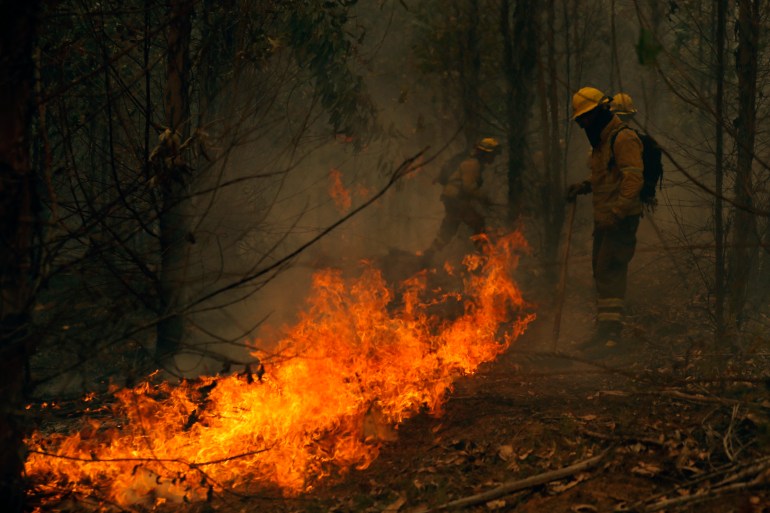At least 23 people killed as dozens of wildfires torch forests in Chile.
The latest emergency order on Saturday covers the southern region of Araucania, next to the previously declared Biobio and Nuble regions, located near the middle of the South American country’s long Pacific coastline.
The measure allows the government to mobilise the military to help battle the fires.
“Weather conditions have made it very difficult to put out [the fires] that are spreading and the emergency is getting worse,” Interior Minister Carolina Toha told reporters at a news conference in the Chilean capital, Santiago.
“We need to reverse that curve,” she added.
At least 23 people have died in connection to the fires, while 979 have been reported injured. More than 1,100 have sought refuge in shelters.
Some 11 of the victims, or nearly half of those reported killed so far, died in the town of Santa Juana in Biobio, located some 500km (310 miles) south of Santiago.
The deaths also included a Bolivian pilot who died when a helicopter that was helping combat the flames crashed in Araucania. A Chilean mechanic also died in the crash.

Some 232 wildfires were still active on Saturday, according to authorities, including 16 that sparked to life earlier in the day, as local temperatures in the southern hemisphere summer exceeded 40C (104F).
Chile’s disaster mitigation agency said 151 of the fires were now under control, while official data released late Friday showed that some 40,000 hectares (99,000 acres) have been burned by the fires.
The three affected regions are sparsely populated and home to many farms, including where grapes, apples and berries are grown for export, plus extensive tracts of forest land.
“I left with what I had on,” said Carolina Torres, who fled from an approaching fire near the city of Puren in the region of Araucania.
“I think everyone here did the same thing because the winds shifted and you just had to grab everything right away.”
Officials said the governments of Spain, the United States, Argentina, Ecuador, Brazil and Venezuela have offered help, including planes and firefighters.
Toha, the interior minister, suggested the fires should serve as yet another wake-up call about the effects of climate change.
“We are becoming one of the [nations] most vulnerable to fires, fundamentally due to the evolution of climate change,” she said.
“The thermometer has reached points that we have never known until now,” she added.
On Friday, President Gabriel Boric cut short his summer vacation and travelled to Nuble and Biobio, pledging to make sure the affected areas receive all necessary support.
Boric also pointed to “signs” that some fires may have been started intentionally but did not provide any additional details.
